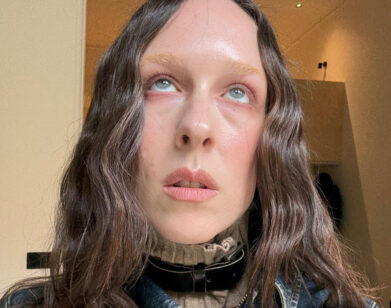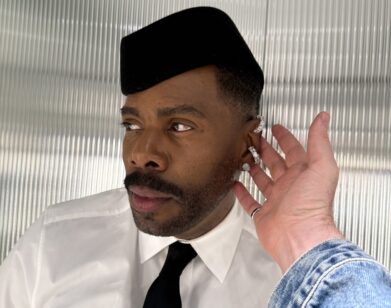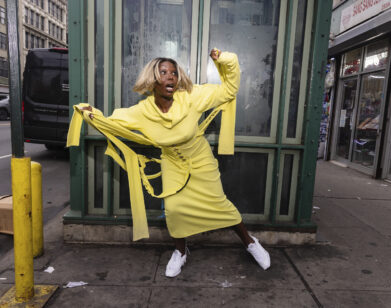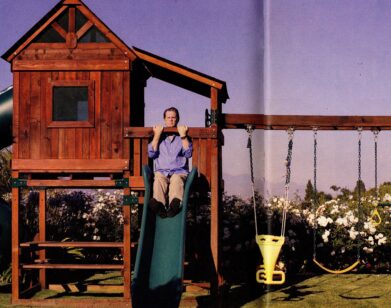Music!
Orville Peck Shows Riley Keough What’s Under His Mask
There’s a lot we don’t know about Orville Peck— like what his face looks like, how much of his country twang is authentic, and where he comes from. It was only recently, following the success of his 2019 debut album Pony, that the country artist began revealing details about his personal life—the 34-year-old artist was raised in Johannesburg, South Africa; trained in ballet for years; and got his start in the city’s punk scene.
Now, three years later, Peck is back with Bronco, a record that’s even more rugged and expansive than its predecessor. The cover art features the artist in a gilded version of his signature fringed mask, in a sea of dirt and smoke, with a towering horse behind him—a reminder that even at the height of his fame, Peck’s true identity eludes his audience. What does anonymity mean to Peck, and why does he seem increasingly more content to let it slip away? The Zola actor Riley Keough—a longtime friend of Peck’s who recently starred in his “Hexie Mountains” music video—called the country crooner to find out.
———
RILEY KEOUGH: So, I guess the people want to know how we ended up working together on the music video.
ORVILLE PECK: We originally worked together by—not accident, but by serendipitous forces. I was doing Lady Gaga’s “Born This Way” for the 10th anniversary and we needed someone to do backup vocals. I remember my friend saying, “Oh, I think Riley might be able to do it.” I was like, “What? Like, Riley Keough, the actress?!” He’s like, “Yeah, people don’t know she can actually sing.” I was so confused and excited. We became pals after that. The rest is country history.
KEOUGH: Okay, I’m really a bad interviewer. Here we go.
PECK: No, you’re doing great.
KEOUGH: Why did you decide to release the album as chapters?
PECK: This album has been super important to me and my cathartic healing from what was a really bad time in my life. Every song was so precious to me that we didn’t know how to pick a single. Also, I wanted people to listen to it like a classic album, it’s not like there are one or two good singles and the rest is just filler, which is sort of how the music world works these days. So we did this sneaky thing where we put them out in batches—very deliberate groupings, to show people that this is an album that should be understood as an entire story, rather than just a couple of pop singles.
KEOUGH: I’m curious about your writing process. I thought “Hexie Mountains” would be a good example, because you wrote that alone, right? Take me through it a little bit.
PECK: I always say I write from a visual place, because I’m not a trained musician. I taught myself to play every instrument I play. I’m terrible with chords and keys and time signatures and whatever the technical aspects of music are. I admire that expertise in other people, but I just never learned any of it. So I picture what I want the song to look like, as if it were a film in my head. For “Hexie Mountains,” I pictured the video that we ended up shooting, and I knew that I wanted it to sound like a lonely bluegrass song. I wanted it to feel like being out in the desert driving alone, trying to figure out where you’re going and what you’re doing. That song is about escapism, which is something I’ve struggled with my whole life. It’s about this idea that no matter what’s going on in your life—on paper it can all be really good; your job is going great, you’re surrounded by people who love you—you still aren’t happy and there’s still a whisper in the back of your head that the grass is greener somewhere else. I wanted to really capture that feeling of longing that never seems to go away for some people.
KEOUGH: I really identify with that. I write movies, and I get really inspired by places. What songs of yours are you most emotionally touched by?
PECK: On this album, “Kalahari Down” gets me pretty emotional. We’ve been performing it a lot on this new tour, and it’s the first time I’m singing about South Africa, where I’m from. It’s about my childhood, and my first crush. When I was a little gay boy, that sparked a lot of trauma and fear in me because as queer people our first crush is often a moment of trauma. We’re afraid of people finding out, and we’re afraid of what we’re going through. It’s a song about—not regret, but thinking back to the place I love, where I’m from, and imagining what it would have been like if I knew then what I know now. It’s also about the bittersweet feeling that I left South Africa to pursue my career. I have a great life and a great career, but I miss home. I left when I was 15, and was still very much figuring myself out. I never got to live there as the person that I am now, who’s way more comfortable with myself.
KEOUGH: What is your relationship to your own performance? Are you able to be objective when you’ve done a show and say, “That was really good”?
PECK: I grew up acting, and I was also a ballet dancer for like 12 years. So, I grew up in a very critical, self-pressured environment where, especially as a dancer, I would go home with my feet bleeding and tell myself I still wasn’t good enough. I had this really intense, quite unrealistic, expectation for myself as a performer for many, many years. Even until a year ago, I would make a mistake during a show, and the rest of the night I would be thinking about that mistake, beating myself up about it. It’s really difficult to be present when you’re judging yourself so, so harshly.
KEOUGH: Even while you’re still performing?
PECK: Yeah. I’ll be singing the words and dancing, but all I’m thinking about is, “You messed up. You have to be better than that.” It’s like acting—to deliver a genuine performance, you have to be free of self-judgment and open yourself up in an unapologetic way where you aren’t afraid of how you’re coming off. I’ve gotten good at that recently. I make a mistake on stage now and I just laugh it off. I almost like making mistakes now, because it reminds me that I’m there to have an authentic connection with people.
KEOUGH: I’m kind of in the exact same place. It really is meditation, you know?
PECK: Totally.
KEOUGH: It’s a real practice of presence and authenticity. You have to be constantly checking in and going, “Stop thinking. Just be here and be honest.”
PECK: Once you get the hang of it, it’s almost a relief, because the other way of doing it is so exhausting. You can remind yourself in those moments, “Actually, all I need to be is myself right now. That’s actually more than enough. And not only is it more than enough, it’s actually the best part of me.” It’s kind of like a weight off your shoulders in a way.
KEOUGH: And what is your relationship with people actually seeing you? Because when you’re on stage, it’s very different to me being behind a camera.
PECK: It’s funny. I’ve joked that I’m an introvert hiding as an extrovert. I always crave attention, I think I love attention, and then the second I get it, I hate it—which maybe explains the mask. But I’m comfortable with it now. It ties into that authenticity that we’re all pursuing all the time. I really trust that all I have to do is tell my story, and not worry about censoring myself or trying to be something I’m not. I did that for years in all different facets of this industry, and it was never as successful as what I do when I’m just myself. The short answer is: I am an awkward person socially. I’m not the life of the party, chatting with everyone. On stage, that maybe becomes easier because it’s such an extreme version of being under the microscope.
KEOUGH: Being yourself isn’t easy—it’s a very challenging and profound journey. Do you ever have imposter syndrome?Half of the people I’ve asked are like, “Oh my god, am I actually good at this? Do I know what I’m doing?” The other half are like, “No, this is exactly where I’m meant to be and I knew this would happen.”
PECK: Oh my god! That’s amazing that people can feel like that, because I’m definitely in the first categor. I got a lot of success very quickly off of my first album, and I definitely felt like an impostor. I grew up playing in bands and being a dancer and all that, but Pony just snowballed so fast that I was, you know, suddenly sitting front row at Dior shows next to the Kardashians and David Beckham, and walking the red carpet at the Grammys with Diplo. These crazy things started happening really fast. It’s sad, because it was so overwhelming that I wasn’t able to take it in and enjoy it. Now, I wouldn’t say, “Oh, yes, I was destined for this,” but I do feel proud of myself and deserving of what I have. I know that I’ve worked very hard for it and I feel with absolute confidence that I deserve to be at the table. It sounds superficial, but the thing that finally killed my imposter syndrome was when Beyoncé asked me to be in her Ivy Park campaign. They were like, “The entire campaign is inspired by you.” I was like—
KEOUGH: “I guess I can sit at this table.”
PECK: If anything can kill your imposter syndrome! That was a big help.
KEOUGH: It’s also really hard when the thing that you’re doing is, like, making magic. There’s not really any rhyme or reason for what we do as artists. When I do something and people praise it, I start overthinking. I’m like, “What did I even do? How did I do it again?” [Both laugh] It’s such an intangible thing, and you can’t replicate it.
PECK: Everyone makes fun of me because I always say, “I don’t know what I’m doing.” I mean it quite earnestly, it’s not a humility thing. I’m making it up as I go along, as many of us are. But Norman Reedus said something really lovely when we were hanging out once, he said, “It’s so cool to see what you’re doing.” I was like, “I don’t know what I’m doing.” He said, “I think you just haven’t realized that you do know what you’re doing.” I was like, “Okay, I can accept that.”
KEOUGH: I totally agree. It’s a trippy thing, especially when you’re doing press. There’s the phase where you’re making the thing and you’re in your zone, and there’s the phase where you have to talk about it. You have to just make it all up. That’s what I do anyways. [Laughs]
PECK: I think there’s something beautiful about that too, though, because if we were hyper-aware of what we were doing, that would be a sign that it was formulaic or maybe a little insincere. I think it’s okay that we don’t know what’s going to come out of our mouths. That’s the best way to be.
KEOUGH: What’s your idea of heaven on earth?
PECK: These days, because I’m so busy, it would definitely involve me just sitting down somewhere. [Both laugh] Maybe with a Bloody Mary. And maybe the sun is shining. And maybe there’s a bunch of animals around, I love animals. And maybe there’s an ocean nearby because I love to swim. And my phone is nowhere in sight. Maybe it’s been thrown out the window. There’s all the people that I love around me. That’s probably my idea of the perfect 24 hours.
KEOUGH: I can really identify with that. Today’s my first day off, and I just want to get food and sit down. That’s heaven today.
PECK: Yesterday, we were playing in Vegas. I had the whole day off and I was just laying in my bed on the tour bus, being so lazy. I kept telling myself, “You should go workout. You should be answering emails.” I have to remind myself, “Man, it’s okay. You can just be lazy and just forgive yourself for it.” You don’t have to be working yourself to death every minute.
KEOUGH: Have you always had that working yourself to death thing?
PECK: Yes, unfortunately. It’s definitely the ballet training. When I was an actor, like, I don’t know how you do it, Riley. The reason I stopped acting is because I couldn’t deal with the pressure I was putting on myself all the time. I had this work ethic ingrained in me that if I wasn’t killing myself, I wasn’t doing enough. I was always looking at the failures, focusing on what I wasn’t doing, and completely forgetting that I was doing so much so well. As I’ve gotten older, I’ve had to force myself to be easier on myself and talk to myself kindly. I’m getting better at it. As you know, it’s a process.
KEOUGH: It really is. I’m the same way. I’ve been acting for a long time, but I didn’t have an extensive theatre background, so I was never in an environment where it was like work, work, work, work. I don’t know where my drive comes from, but you attribute yours to ballet?
PECK: I think that exacerbated it. But I mean, even outside of this industry, a theme of the human condition is this unwillingness to be kind to ourselves. We’re taught to be kind to others, but I never, ever thought to turn that back on myself. I’ve had to learn that. I’m 34 years old.
KEOUGH: It’s incredible that it takes this long to learn to just be kind to yourself. My last question for you is: what are we doing on this planet, Orville?
PECK: I have no idea. I think about it all the time. I stop myself sometimes and I’m like, “Oh my god, the moon! What is that fucking thing doing in the sky? Where are we?” Growing up in South Africa, nature and wildlife were a huge part of my childhood. I’m like a super gardener. Nature always grounds me, and reminds me that none of us know what we’re doing here, we’re all trying to thrive on this weird rock plummeting through space.” [Laughs]
KEOUGH: What a trip.
PECK: Don’t get me started. I’ll start on an existential spiral at the drop of a hat. [Both laugh]









